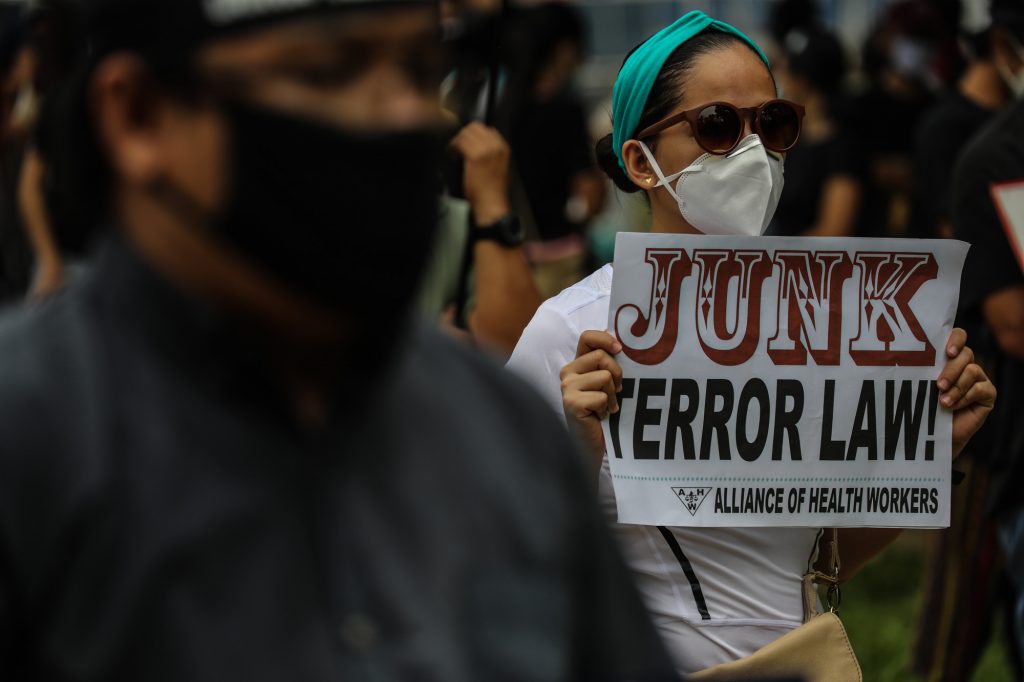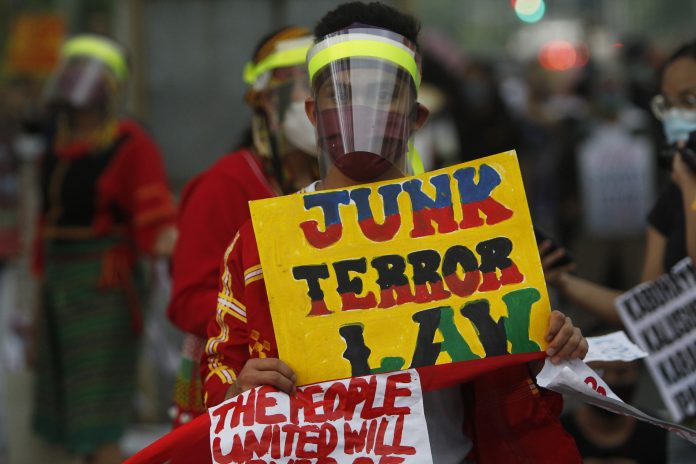Several religious leaders are trying to help unite the Philippines’ fractious political opposition days before a new draconian anti-terrorism law takes effect.
Lasallian Brother Armin Luistro announced on Friday, July 17, that 90 organizations “of different colors and geographical locations” will be joining a grand #SONAgkaisa protest when President Rodrigo Duterte delivers his fifth State of the Nation Address on July 27.
The religious brother said the groups will launch “unified and separate initiatives” ahead of the “grand protest” with a two-pronged caravan on July 18 to show opposition to the refusal of Congress to issue a franchise to broadcast network ABS-CBN.
Brother Luistro, a convenor of the multi-faith “One Voice coalition,” and Benedictine nun Mary John Mananzan of the Movement Against Tyranny (MAT), led the online media briefing attended by a dozen political alliances.
Speakers took turns highlighting the historical significance of the display of unity.
Opposition Senator Francis Pangilinan said the level of opposition was last seen in 1999 during protests that led to the ouster of former president Joseph Estrada in 2000.
Renato Reyes, secretary general of the leftist Bagong Alyansang Makabayan (Bayan), said the biggest mass action on July 27 will be held in Quezon City with various political blocs holding separate activities before converging at a still undisclosed location.
Three major loose networks will be spearheading the protests: Bayan and MAT, the Movement Against the anti-Terrorism Act (MATA) and Tindig Pilipinas, a coalition linked to the previous administration of Benigno Aquino III.
All these groups feature high-profile leaders that have been targets of President Duterte’s ire and “red-tagging” by the military and the police.
Coalitions of lawyers’ groups also announced that the will deploy lawyers across the country to ensure the protection of the rights of protesters.
Creative protest
Bayan’s Reyes said protesters will be required to follow health protocols, including the wearing of masks and physical distancing.
The July 27 protests is expected to be the first big unified political action following the 2018 State of the Nation protests, although a smaller, but more creative event took place last year.
Participants in this year’s demonstrations are expected to wear masks and costumes representing their concept of defeating “the deadly virus in Malacañang,” the presidential palace.
Artists will also be launching online exhibits and art installations in protest areas.
Celebrities, many angered over the closure of broadcast giant ABS-CBN, are expected to show up in the venues and online.
This year’s theme highlights two major issues: the government’s “disastrous handling” of the coronavirus pandemic and the anti-terrorism law signed by the president earlier.

Former Chief Justice Maria Lourder Sereno said, an evangelical Christian, called on Filipinos to “distinguish support for government and the common good from idolatry of one who can only lead us to downfall.”
Duterte’s continuing hold on power has been partly traced to an opposition weakened by ideological and political differences that are prone to focusing fire on each other rather than on the government.
Bishop Broderick Pabillo, apostolic administrator of the Archdiocese of Manila, raised a challenge to the protest organizers.
“This shouldn’t stop at one event,” he said. “What happens after?”
Reporters posed the same question during the media briefing after representatives stressed the historical roots of the event.
Senator Pangilinan said all groups should strive to create safe avenues of expression for citizens, especially those new to the protest movement.
“The more we are, the easier to forge unities,” he said.
MATA’s Jean Enriquez said the unity should not be temporary. “We need to focus on the end goal and our work won’t be done overnight,” she said.
Duterte’s critics said that with the coronavirus pandemic the president has waged a new war against the poor.
Police have already arrested about 30,000 people for violating quarantine measures. Also arrested were scores of protesters and aid givers. Most have been released by order of prosecutors and courts, but some contracted COVID-19 while in detention.
The government was also reported to have barely delivered half of its 2-billion peso social aid program and only 21 percent so far of pledged aid to workers left jobless.
Delays and deadlines resulted in huge crowds in poor communities, which health activists said contributed to the spike of new cases of the new coronavirus disease in June and July.
Labor leaders who pledged to join the July 27 protest said unemployment in the country is at a record 17 percent while underemployment due to shortened workdays is at an even higher rate, from 40 to 60 percent of the total workforce.









